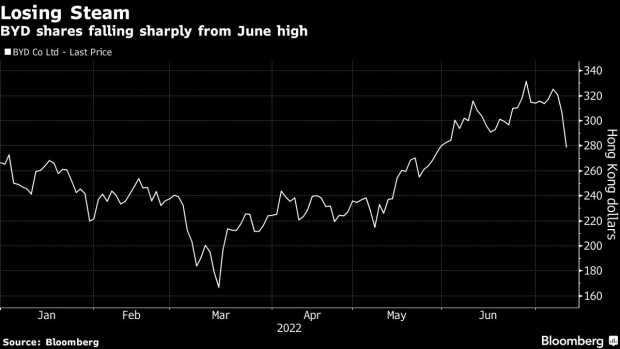Jul 12, 2022
BYD Sinks After Berkshire-Sized Stake Appears in Clearing System
, Bloomberg News

(Bloomberg) -- Chinese electric-car giant BYD Co. slumped as much as 11% on Tuesday after a stake matching the size of Berkshire Hathaway Inc.’s appeared in Hong Kong’s stock-market clearing system, fueling speculation that Warren Buffett’s firm may be adjusting its holdings.
BYD’s shares circulating in the city’s clearing system, which facilitates trades, rose 20.49 percentage points to 99.93% of the company’s total shares, according to exchange data as of Monday.
Berkshire Hathaway held a 20.49% stake in BYD, according to Bloomberg-compiled data based on a December filing. Most of the share moves took place in accounts held by Citibank, according to exchange figures.
“For BYD, we are seeing more than 20% of stake moved to the CCASS system. Only Berkshire would have that many shares as a single investor, so the market is worried Buffett is planning to sell,” said Steven Leung, executive director at UOB Kay Hian in Hong Kong, referring to the city’s Central Clearing and Settlement System.
“Whenever there is an increase in the CCASS system, it will trigger concerns over the near-term selling pressure of a stock, because sellers will need to move their shares to the system to settle the deal.”
Berkshire Hathaway didn’t immediately respond to a request for comment after normal business hours. BYD and Citi couldn’t immediately be reached for comment.
The stake held by Buffett’s firm in BYD remains unchanged as shown by data available to BYD, the Securities Times newspaper reported, citing an unidentified official at the securities affairs office of BYD.
BYD’s Hong Kong-listed stock reached a record high after nearly doubling from a March low, amid a boom in China electric-vehicle shares in recent months, thanks to a slew of government stimulus measures to boost consumption including subsidies and tax cuts.
BYD managed to navigate supply chain disruptions caused by Shanghai Covid lockdowns to post record monthly production and sales in May. Analysts expect the firm to sell 1.5 million vehicles this year, doubling from 2021, with its vertically-integrated business structure giving it a lead over rivals.
Despite the share surge, BYD’s forward price-to-earnings ratio of 67 is still near its three-year average and much lower than its local peer Li Auto Inc.’s 148 times, according to Bloomberg-compiled data. BYD’s multiple, however, surpassed that of Elon Musk’s Tesla Inc. in late April after a slump in the latter company’s shares.
(Updates with Securities Times report in seventh paragraph)
©2022 Bloomberg L.P.





